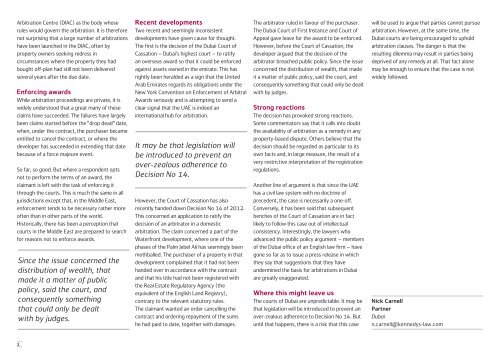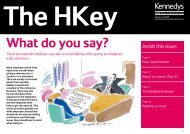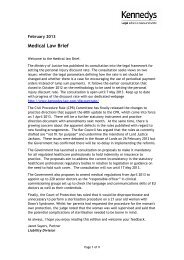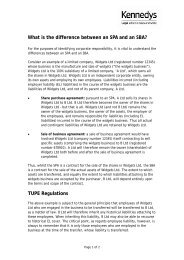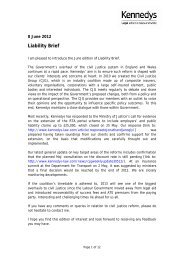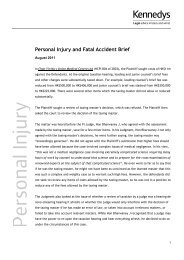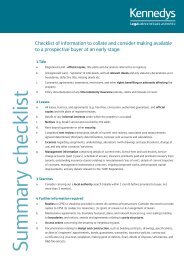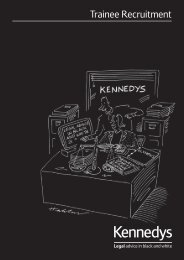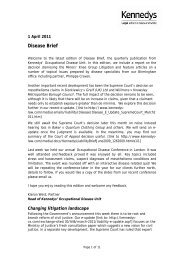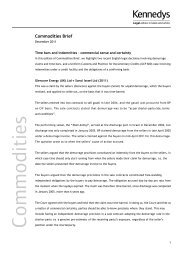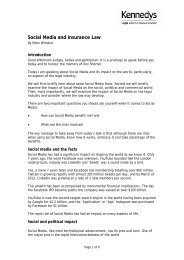Download The Key - Winter 2012 (PDF, 468KB) - Kennedys
Download The Key - Winter 2012 (PDF, 468KB) - Kennedys
Download The Key - Winter 2012 (PDF, 468KB) - Kennedys
You also want an ePaper? Increase the reach of your titles
YUMPU automatically turns print PDFs into web optimized ePapers that Google loves.
Arbitration Centre (DIAC) as the body whose<br />
rules would govern the arbitration. It is therefore<br />
not surprising that a large number of arbitrations<br />
have been launched in the DIAC, often by<br />
property owners seeking redress in<br />
circumstances where the property they had<br />
bought off-plan had still not been delivered<br />
several years after the due date.<br />
Enforcing awards<br />
While arbitration proceedings are private, it is<br />
widely understood that a great many of these<br />
claims have succeeded. <strong>The</strong> failures have largely<br />
been claims started before the “drop dead” date,<br />
when, under the contract, the purchaser became<br />
entitled to cancel the contract, or where the<br />
developer has succeeded in extending that date<br />
because of a force majeure event.<br />
So far, so good. But where a respondent opts<br />
not to perform the terms of an award, the<br />
claimant is left with the task of enforcing it<br />
through the courts. This is much the same in all<br />
jurisdictions except that, in the Middle East,<br />
enforcement tends to be necessary rather more<br />
often than in other parts of the world.<br />
Historically, there has been a perception that<br />
courts in the Middle East are prepared to search<br />
for reasons not to enforce awards.<br />
Since the issue concerned the<br />
distribution of wealth, that<br />
made it a matter of public<br />
policy, said the court, and<br />
consequently something<br />
that could only be dealt<br />
with by judges.<br />
Recent developments<br />
Two recent and seemingly inconsistent<br />
developments have given cause for thought.<br />
<strong>The</strong> first is the decision of the Dubai Court of<br />
Cassation – Dubai’s highest court – to ratify<br />
an overseas award so that it could be enforced<br />
against assets owned in the emirate. This has<br />
rightly been heralded as a sign that the United<br />
Arab Emirates regards its obligations under the<br />
New York Convention on Enforcement of Arbitral<br />
Awards seriously and is attempting to send a<br />
clear signal that the UAE is indeed an<br />
international hub for arbitration.<br />
It may be that legislation will<br />
be introduced to prevent an<br />
over-zealous adherence to<br />
Decision No 14.<br />
However, the Court of Cassation has also<br />
recently handed down Decision No 14 of <strong>2012</strong>.<br />
This concerned an application to ratify the<br />
decision of an arbitrator in a domestic<br />
arbitration. <strong>The</strong> claim concerned a part of the<br />
Waterfront development, where one of the<br />
phases of the Palm Jebel Ali has seemingly been<br />
mothballed. <strong>The</strong> purchaser of a property in that<br />
development complained that it had not been<br />
handed over in accordance with the contract<br />
and that his title had not been registered with<br />
the Real Estate Regulatory Agency (the<br />
equivalent of the English Land Registry),<br />
contrary to the relevant statutory rules.<br />
<strong>The</strong> claimant wanted an order cancelling the<br />
contract and ordering repayment of the sums<br />
he had paid to date, together with damages.<br />
<strong>The</strong> arbitrator ruled in favour of the purchaser.<br />
<strong>The</strong> Dubai Court of First Instance and Court of<br />
Appeal gave leave for the award to be enforced.<br />
However, before the Court of Cassation, the<br />
developer argued that the decision of the<br />
arbitrator breached public policy. Since the issue<br />
concerned the distribution of wealth, that made<br />
it a matter of public policy, said the court, and<br />
consequently something that could only be dealt<br />
with by judges.<br />
Strong reactions<br />
<strong>The</strong> decision has provoked strong reactions.<br />
Some commentators say that it calls into doubt<br />
the availability of arbitration as a remedy in any<br />
property-based dispute. Others believe that the<br />
decision should be regarded as particular to its<br />
own facts and, in large measure, the result of a<br />
very restrictive interpretation of the registration<br />
regulations.<br />
Another line of argument is that since the UAE<br />
has a civil law system with no doctrine of<br />
precedent, the case is necessarily a one-off.<br />
Conversely, it has been said that subsequent<br />
benches of the Court of Cassation are in fact<br />
likely to follow this case out of intellectual<br />
consistency. Interestingly, the lawyers who<br />
advanced the public policy argument – members<br />
of the Dubai office of an English law firm – have<br />
gone so far as to issue a press release in which<br />
they say that suggestions that they have<br />
undermined the basis for arbitrations in Dubai<br />
are greatly exaggerated.<br />
Where this might leave us<br />
<strong>The</strong> courts of Dubai are unpredictable. It may be<br />
that legislation will be introduced to prevent an<br />
over-zealous adherence to Decision No 14. But<br />
until that happens, there is a risk that this case<br />
will be used to argue that parties cannot pursue<br />
arbitration. However, at the same time, the<br />
Dubai courts are being encouraged to uphold<br />
arbitration clauses. <strong>The</strong> danger is that the<br />
resulting dilemma may result in parties being<br />
deprived of any remedy at all. That fact alone<br />
may be enough to ensure that the case is not<br />
widely followed.<br />
Nick Carnell<br />
Partner<br />
Dubai<br />
n.carnell@kennedys-law.com<br />
2


